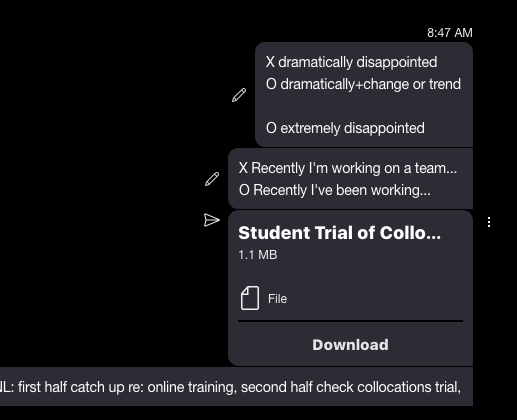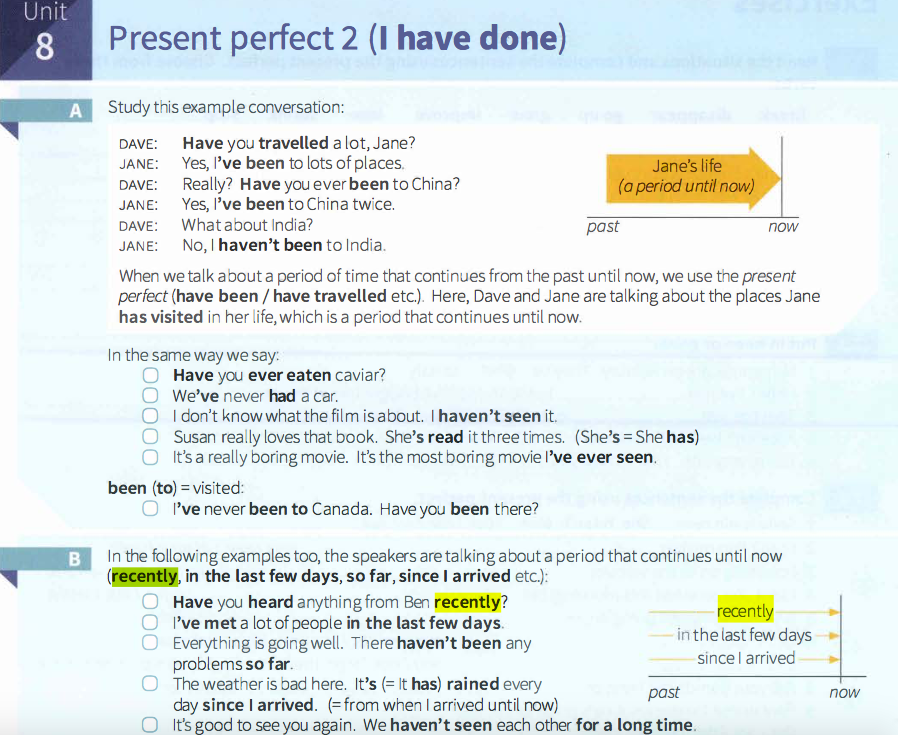Course selection: goals vs. corrections
Choosing a course from goals vs. choosing from corrections
Some students come with clear goals. Be it a target test score, a big deadline or a triggering event, a clear goal is a need we can meet. Trial lessons for such students are straightforward: give them a course that meets their need.
Some students have broad, fuzzy goals. They need to use English with colleagues, with their boss, their clients, on trips or in their free time. Trial lessons for these students are more complex. Most courses meet some aspect of their goals. Picking one is a little complicated.
Furthermore, teachers need to listen carefully for needs and capabilities that come up in the lesson itself.
Goals-based recommendations
If the student has included information in their profile, or if they are from a corporate client that has clear needs and metrics (like a G.B.C. test score) you can plan on picking a course that meets their goal.
However, you must always pay attention to real student needs that arise in the first lesson.
Corrections-based recommendations
Choosing a course based on student correction is far and away the more impressive option. It's a very simple 3-step process:
- Correct the student.
- Let the correction land.
- Send the book page that fleshes out that correction.
Not all corrections will result in a course recommendation. But, if you have a couple of ideas in mind, then you can listen for specific errors that you can correct and then springboard into a course.
Turning corrections into courses depends on your knowledge of the course library and on which lessons you can do as a killer lesson.
A killer lesson is a subject you are skilled at teaching and that connects deeply with the student.
Important: using a page from a course when giving a correction is not only useful in a trial lesson. It's always a good idea. After a significant time at The English Farm, most students should have seen most courses.
Below are some examples.
You do not need to be able to do a killer lesson from all these courses. But do think about which courses you teach well. Also, think about which you want to teach better and try them out with your regular students.
Connected speech
- I'm hearing you speak quite clearly, but you are saying each word separately. You said, "I. work. as. a. consultant." You should say it more like, "I WOR-ka-sa-con-SUL-tnt"
- Have you studied connected speech before?
- You haven't? Oh, would you like to speak smoothly? Then I have the perfect course for you.
[Send the connected speech trial of Pronunciation In Use Int]
Clear word stress
- You said that your job is a consultant. But I heard /kon-sul-tan-tu/. That's not actually how to say that word. You need to unstress some syllables.
- Have you studied the schwa sound before?
- You haven't? Oh, would you like to speak clearly? Then I have the perfect course for you.
[Send the schwa trial of Clear Speech Int]
Collocations
You can see the error I corrected about why "dramatically" doesn't collocate with "disappointed" resulted in me sending the student trial of Collocation In Use.
There is also another error I corrected before sending the course.

Answering clearly
If you ask a big question and the student fumbles the beginning, then jump into a course that covers that.
- I asked about your industry, and the first 10 or 20 seconds of your answer were very hard to understand.
- Have you studied how to respond to tough questions?
- I have the perfect course: it's about how to clearly answer questions and have discussions in English.
[Send Speaking Test Strategies unit 2 about answering well]
Introductions
Some students may fumble through their introductions. This should be the easiest thing for any student to do!
- Your introduction was easy to understand, but it actually wasn't very professional. You have studied introductions, right? When?
- I have a quick little quiz: how many times have you said, "It's nice to meet you?" (So, so many) "Okay how many times have you said "It was nice to meet you?" Native speakers always end a first meeting like this! It should be roughly the same number!
- Introductions are important in consulting. I have a course that will help you
[Send Consulting lesson 1]
Grammar
If your student makes a grammar mistake, you can send them a screenshot with the correction.
- You said, "Recently I was busy." Can you tell me where the mistake is in that sentence? )...You actually should use the perfect tense, "I've been busy.")
- Is it important for you to speak correctly?
- Okay, let's take a look at this...
[Open Grammar In Use Int, ctrl+f "recently" and send that screenshot:
